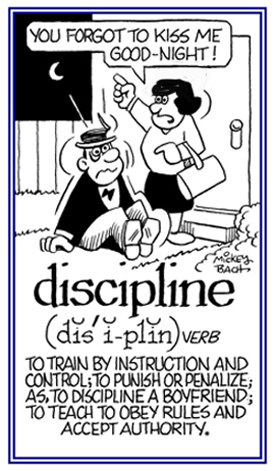discip- +
(Latin: discipulus, pupil, apprentice; instruction, teaching, learning (to learn), knowledge)
Also translated as, "A young ox learns to plow from an older one." or "The young learn from their elders."
Motto of Marycrest College, Davenport, Iowa, USA; and College of Mount Saint Vincent, Riverdale, New York, USA.
Motto of College of Mount Saint Vincent, Riverdale, New York, USA.
2. One of the personal followers of Jesus Christ during his life; especially, one of the Twelve Disciples.
3. Also applied in the New Testament to the early Christians generally; hence, in religious use, a professed follower of Christ, a Christian, or a believer.
4. A person who follows, or is influenced by, the doctrine or example of another person; one who belongs to the "school" of any leader of thought.
5. Someone who strongly believes in the teachings of a leader, a philosophy, or a religion, and is loyal to the group of his or her choice.
Motto of the University of Texas, Austin, Texas, USA.
A motto of fortitude and steadfastness.
2. Anyone who enforces discipline (in an army, school, family, etc.).
3. An upholder or advocate of strict discipline.
2. A controlled orderly state; especially, in a class of school children.
3. The ability to behave in a controlled and calm way even in a difficult or stressful situation.
4. Mental self-control used in directing or changing behavior, learning something, or training for something.
5. A branch of instruction or education; a department of learning or knowledge; a science or art in its educational aspect; a subject or field or activity, e.g., an academic subject.
6. Instruction having for its aim to form the pupil to proper conduct and action; the training of scholars or subordinates to proper and orderly action by instructing and exercising them in the same; mental and moral training; also used figuratively of the training effect of experience, adversity, etc.
7. The order maintained and observed among pupils, or other persons under control or command; such as, soldiers, sailors, the inmates of a religious house, a prison, etc.
8. Etymology: from Latin discipulus, "pupil", from discipere, "to grasp intellectually, to analyze thoroughly"; from dis-, "apart" + capere, "to take".
2. To train oneself to do something by controlling his or her behavior: Sharon said that she was disciplining herself to eat less and to exercise more often.
The students were determined to discipline themselves by learning at least five new vocabulary words each day and to have the highest scores on the weekly tests that will include those words.

Go to this Word A Day Revisited Index
so you can see more of Mickey Bach's cartoons.
Henry has a more disciplined approach to the problem than the other members of the group.
2. Those who promote systems of behavior: Military units have many discipliners or instructors who work with troops to develop co-ordinated behavior and skills for their assigned duties.
"The religious group sent out their disciples to discipulate others so they, too, could live the good life of religious devotion to God."
A maxim that is obvious to good teachers and which leads to Doce ut discas, "Teach in order to learn."
Inter-related cross references, directly or indirectly, involving word units meaning "know, knowledge; learn, learning": cogni-; gno-; histor-; intellect-; learn, know; math-; sap-; sci-; sopho-.

